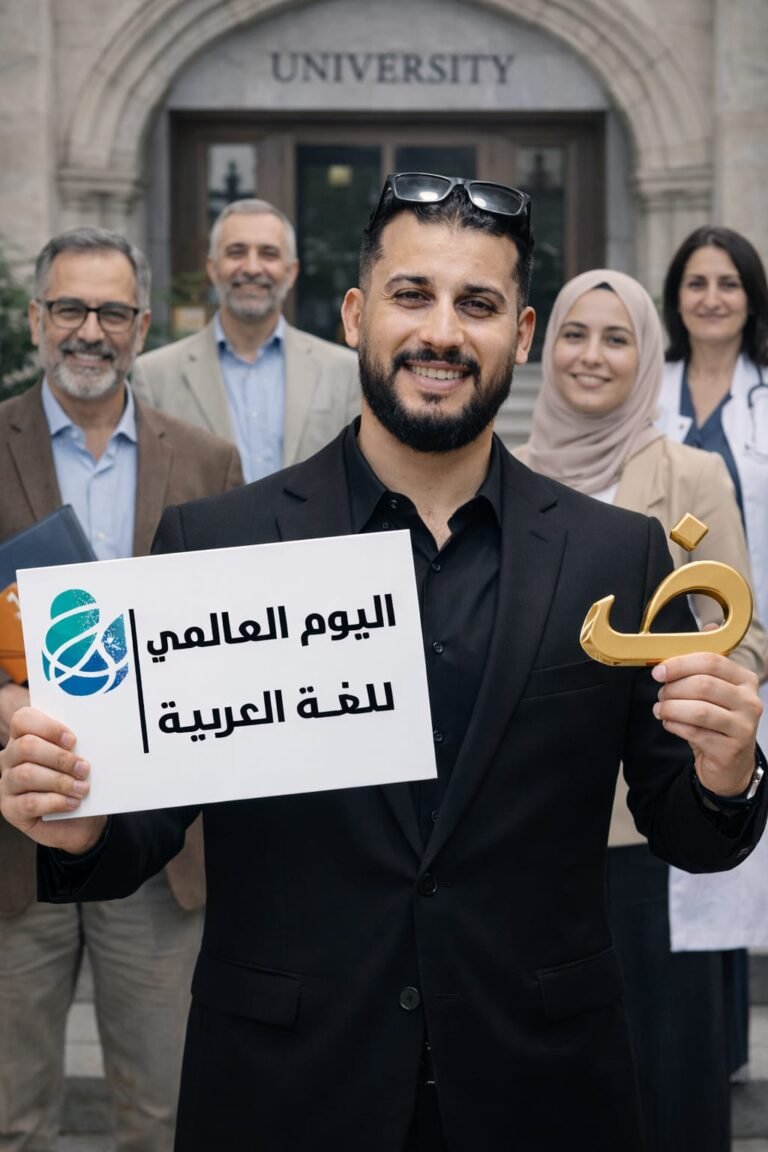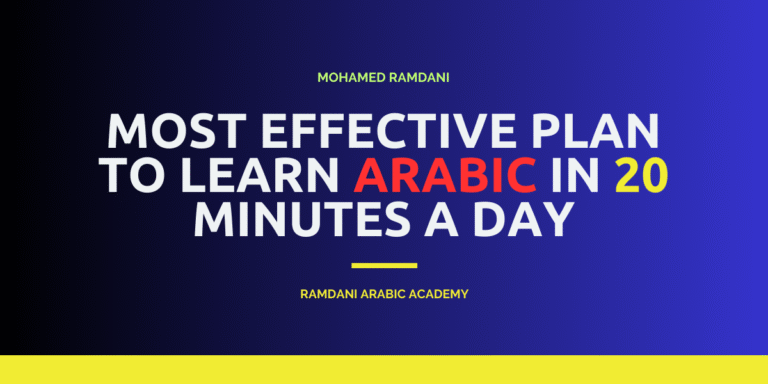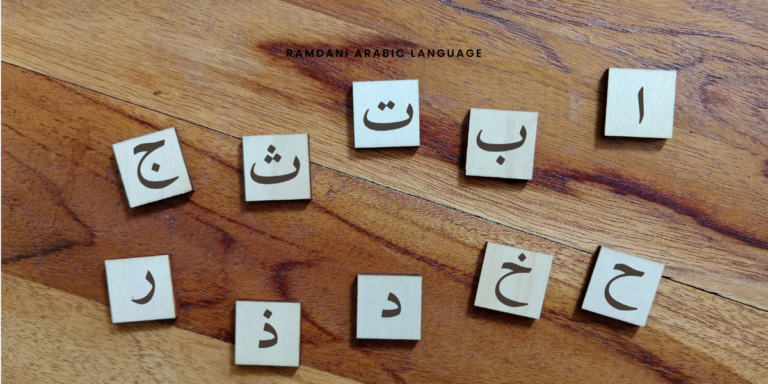20 Essential Arabic Learning Advice for Non-Arabic Speakers
My name is Mohamed Ramdani. I’m a Moroccan Arabic teacher. I have a degree in Islamic Studies and over seven years of experience teaching Arabic to non-native speakers, especially children of Arab families living abroad. I focus on reading and writing skills. I also hold several diplomas in teaching methodologies, which I apply every day in my online lessons.
In this series, I want to share practical advice for learning Arabic. These are not theories or textbook rules. These are tips based on what I see in real students. I’ve taught people from many countries—Muslims who want to understand the Qur’an, children of immigrants who want to keep their language, and adults who learn Arabic for work or travel. The challenges are different, but the methods that work are often the same.
This first article gives you 20 clear pieces of advice. Each one will help you improve step by step. If you are serious about learning Arabic, I want this to be useful to you. I don’t believe in shortcuts, but I believe in smart effort and consistency.
If you apply even a few of these tips, you’ll start to see progress. Let’s begin.

Advice number 1
Advice 1: Learn the Arabic Alphabet Properly
Many learners rush through the alphabet. They memorize the letters quickly but don’t understand how they change shape or connect in writing. This creates problems later with reading and writing.
You need to spend time mastering each letter in all its forms:
- Isolated
- Beginning
- Middle
- End
Start by writing each letter by hand. Repeat it daily. Focus on clean, clear shapes. Don’t rely only on typing. Arabic is a script language. Handwriting helps your brain recognize the forms faster.
Learn the difference between similar letters. For example:
- ب ت ث
- ج ح خ
- د ذ
- ر ز
Group them. Practice them in short words. Read and write them in context. Use flashcards or handwritten sheets to test yourself.
Understand that Arabic connects letters. Some letters connect only on one side. Others don’t connect at all from the left. Learn these rules early so you avoid confusion later. For example, the letter د cannot connect to the left. This means the next letter starts a new form.
Don’t skip the sounds. Learn the pronunciation of each letter clearly, especially the sounds that don’t exist in your native language—like ع، غ، ق.
If you build a strong foundation with the alphabet, everything else becomes easier. If you rush this step, you’ll struggle later. Take your time. Get it right from the beginning.
Advice number 2
Advice 2: Master Short Vowels Before You Move On
Most learners start reading Arabic without understanding the short vowels. They try to guess words or read without vocalization (tashkeel). This leads to confusion, mispronunciation, and weak reading skills.
Arabic has three short vowels:
- Fatha (ـَ)
- Kasra (ـِ)
- Damma (ـُ)
These small marks change the meaning and sound of a word. For example:
- كَتَبَ (kataba) = he wrote
- كُتِبَ (kutiba) = it was written
- كَاتِب (kaatib) = writer
Missing a single mark changes everything.
Start by reading simple words with full tashkeel. Focus on accuracy, not speed. Read aloud. Train your mouth to pronounce each vowel clearly. Record yourself and listen. You’ll catch mistakes faster that way.
Avoid jumping to long texts without vocalization. Many learners do this too early. They get used to guessing words based on shape, not sound. This creates bad habits.
Practice short texts every day. Use beginner books, children’s stories, or Qur’anic verses with full vocalization. Repeat the same texts several times. Fluency comes from repetition.
Only move to unvocalized texts when you’re confident with vowels and your reading is smooth.
Reading without vowels is not a goal for beginners. Accuracy comes first. Fluency comes after.
Advice number 3
Advice 3: Build a Daily Reading Habit, Even If It’s Just 10 Minutes
Many students think they need hours of study to improve. That’s not true. What you need is consistency. Ten focused minutes every day is better than two hours once a week. Arabic rewards repetition.
Start small. Pick a simple text with full vowels. This could be a children’s story, a short hadith, or a basic reading book. Don’t just read silently. Read out loud. Hear the rhythm. Hear the structure. Arabic is a phonetic language—your tongue must get used to the sounds.
Use your finger as you read. Follow the letters. Connect them in your mind. Don’t guess. If you don’t recognize a word, stop. Look it up. Write it down. Use it in a sentence. Then read again.
You’ll start slow. That’s normal. But if you do this every day, your speed and confidence will grow. You’ll also start to see the same words and patterns again and again. This builds your memory naturally.
Avoid distractions. No phone. No background noise. Just you and the text.
Make this a daily habit. Before bed. After Fajr. During lunch. Whatever time works for you—stick to it.
Arabic doesn’t come with pressure. It comes with patience.
Advice number 4
Advice 4: Use Writing to Strengthen Your Reading
Most students try to read without writing. That’s a mistake. Reading and writing are two sides of the same skill. If you want to read faster, start writing more. Not typing—real handwriting.
When you write a word, your brain processes its structure. You learn the shape, the connection, the spelling. This helps you recognize it when you read. It also improves your memory.
Start with simple exercises:
- Copy short sentences with full vowels
- Write the same sentence several times
- Read it aloud after writing
- Try to write it from memory without looking
Choose short texts. Copy them word by word. Focus on your pen control. Make the letters clear and correct. Don’t rush.
Use lined paper with Arabic guides. This helps with proper spacing and letter size. Writing well takes time. But it makes a big difference in your progress.
Also, write new vocabulary in a notebook. Not just the meaning—write the full word, the plural form, an example sentence. Make writing part of your study routine.
Writing slows you down in a good way. It forces you to notice the details. That’s how you build accuracy.
Read with your eyes. Write with your hand. Learn with both.
Advice number 5
Advice 5: Focus on High-Frequency Words First
Many learners waste time memorizing rare or advanced vocabulary too early. They study words they don’t see often. This slows progress and leads to frustration.
Arabic, like any language, has a core vocabulary. These are the words that appear in almost every sentence. If you learn these first, you’ll understand more, faster.
Start with:
- Pronouns: أنا، أنتَ، هو، هي، نحن
- Common verbs: كتب، قرأ، ذهب، أكل، شرب
- Daily nouns: بيت، كتاب، طعام، باب، قلم
- Simple prepositions: في، على، من، إلى، مع
You can find frequency lists online or in beginner Arabic books. Aim to learn the first 100 to 300 words. Write them. Use them in simple phrases. Repeat them in your reading and writing practice.
Make flashcards. Keep them physical or digital. Review them daily. Don’t just memorize meanings. Say the word out loud. Spell it. Use it in your own example.
Focus on words that appear in your reading material. Don’t chase random vocabulary from advanced texts.
Every language has a core. Arabic is no different. Mastering that core gives you access to real understanding.
Build your base. Then grow from it.
Advice number 6
Advice 6: Don’t Avoid Grammar—Start With the Basics
Many students try to skip grammar. They say, “I just want to speak,” or “Grammar is too hard.” That’s a mistake. Without basic grammar, your Arabic will stay broken and unclear.
You don’t need to study complex grammar in the beginning. But you do need the foundations. Start with:
- Noun and verb structure
- Masculine and feminine forms
- Singular, dual, and plural
- Subject–verb agreement
- Definite and indefinite nouns
- Basic sentence types: nominal (جملة اسمية) and verbal (جملة فعلية)
Don’t memorize rules without examples. Take one rule. Learn it. Apply it in real sentences. Write it. Say it. Read it. Then move to the next.
Use beginner grammar books with clear examples. Al-‘Arabiyyah Bayna Yadayk is one option. Watch short grammar lessons online. Choose teachers who give examples, not just theory.
Also, don’t avoid i‘raab (case endings). Even if you don’t apply it fully in speech, it helps in reading, writing, and understanding structure.
Grammar is not a separate subject. It’s part of your Arabic. It helps you build correct sentences and understand what you read.
If you study grammar with focus and examples, it becomes clear.
Skip it, and you’ll stay stuck.
Advice number 7
Advice 7: Use Your Native Language to Understand Arabic—Then Leave It
At the start, you need to rely on your native language. That’s normal. It helps you understand meanings, structure, and grammar. But if you keep depending on translation, you’ll never think in Arabic.
In the beginning:
- Translate vocabulary into your language
- Use bilingual dictionaries
- Compare sentence structure
- Write Arabic examples with translation next to them
But set a limit. After the first few months, start reducing translation. Try to explain Arabic in Arabic. Use pictures, gestures, or simple Arabic definitions. When you read a sentence, don’t go word by word into your language. Ask yourself: what does it mean as a whole?
If you read “ذهب محمد إلى المدرسة,” train yourself to understand it as a full idea, not “went + Muhammad + to + the school.” Your brain should read it and immediately picture the meaning.
Same in writing. Avoid thinking in your language, then translating. It leads to errors. Instead, build basic Arabic sentence patterns and use them naturally.
Think of translation as training wheels. You need them at first. But you must remove them if you want to ride freely.
Arabic is not just words. It’s a way of thinking.
Advice number 8
Advice 8: Listen Every Day—Even If You Don’t Understand Everything
Listening is not just for advanced learners. You should start listening from day one. Your brain needs to hear Arabic to get used to its rhythm, sounds, and patterns.
Don’t wait until “you’re ready.” That day never comes. Listen now.
Start with slow, clear audio:
- Short Arabic stories for beginners
- Arabic cartoons with subtitles
- Qur’an recitation with translation
- Basic dialogue videos
- Audio from your textbooks
Listen actively. Don’t play it in the background. Sit. Focus. Follow the words. Repeat the same audio every day for a week. Each time, you’ll understand more.
At first, it will feel like noise. That’s fine. Your brain is learning the music of the language. Over time, it will catch words, then phrases, then full sentences.
Write down new words you hear often. Try to use them. Imitate pronunciation. Repeat full sentences. Copy the tone, stress, and speed.
Avoid advanced news or fast speech in the beginning. It will overwhelm you. Choose your level and stay consistent.
You learned your first language by listening before speaking. Arabic is no different.
Expose your ears daily. Let Arabic become familiar.
Advice number 9
Advice 9: Practice Speaking Without Fear of Mistakes
Many learners avoid speaking because they fear making mistakes. This fear slows progress. Mistakes are part of learning. You must accept them and keep speaking.
Start simple. Use basic phrases and sentences. Don’t worry about perfect grammar or vocabulary. Focus on communication.
Find a language partner or join online groups. Speaking regularly builds confidence. Even short daily conversations help.
Record yourself speaking. Listen and notice areas to improve. Repeat sentences aloud until they sound natural.
Use what you know. Don’t wait to learn more words or grammar. Speaking helps you remember vocabulary and improve pronunciation.
Remember, native speakers expect learners to make mistakes. They appreciate the effort more than perfection.
Push yourself. Speak even if you feel unsure. Every word spoken is progress.
Speaking is a skill. It gets better with practice.
Advice number 10
Advice 10: Use Technology Wisely to Support Your Learning
Technology offers many tools for learning Arabic. Apps, websites, videos, and online tutors are easily accessible. But you need to use them smartly.
Choose resources that fit your level and goals. For example:
- Apps like Duolingo or Memrise for vocabulary
- YouTube channels with clear explanations
- Online dictionaries with audio pronunciation
- Websites for Arabic reading practice with translations
Don’t try to use everything at once. Pick two or three tools and stick to them. Overloading yourself wastes time and causes confusion.
Set a daily limit for using apps. Use them as supplements, not your main study method. The core of your learning should be reading, writing, speaking, and listening practice.
Use technology to find real Arabic content—news, podcasts, stories. This connects you to the language as it’s used daily.
Remember, no app or website replaces a good teacher or regular practice. Technology is a tool, not a shortcut.
Use it wisely. Keep your learning focused and active.
Advice number 11
Advice 11: Learn Arabic Roots to Unlock Vocabulary
Arabic words come from roots, usually three letters. Understanding roots helps you guess meanings and learn many related words at once.
For example, the root ك-ت-ب relates to writing. From it you get:
- كَتَبَ (kataba) – he wrote
- كِتاب (kitāb) – book
- كاتِب (kātib) – writer
- مَكتَب (maktab) – office
- مَكتَبة (maktaba) – library
Learning roots lets you see connections between words. It also helps with spelling and pronunciation.
Start by memorizing common roots. Use root dictionaries or apps. When you learn a new word, check its root and other related words.
This method speeds up vocabulary learning. Instead of memorizing words separately, you understand a whole family of words.
Roots also clarify grammar patterns. Many verbs and nouns follow predictable forms based on roots.
Don’t ignore roots. They are a key to mastering Arabic.
Advice number 12
Advice 12: Practice Writing Short Paragraphs Regularly
Writing short paragraphs helps you organize your thoughts in Arabic. It forces you to use vocabulary and grammar actively, not just recognize them when reading.
Start with simple topics:
- Introduce yourself
- Describe your daily routine
- Talk about your family
- Write about your favorite food or hobby
Keep paragraphs short—3 to 5 sentences. Focus on clear sentences, correct word order, and proper endings.
Don’t worry about mistakes at first. Write, then review. Use a dictionary or grammar guide to fix errors.
Share your writing with a teacher, tutor, or language partner. Feedback is essential to improve.
Over time, your writing will become more fluent. You will notice gaps in your vocabulary or grammar, giving you clear areas to focus on.
Writing is active learning. It improves your reading and speaking too.
Make writing a regular habit. It’s a practical way to build real Arabic skills.
Advice number 13
Advice 13: Immerse Yourself in Arabic Media
To improve your Arabic, surround yourself with the language daily. Watch Arabic movies, listen to Arabic music, or follow Arabic social media.
Choose content that interests you. If you like history, watch documentaries in Arabic. If you enjoy cooking, find Arabic cooking shows or recipes.
Use subtitles if needed. Start with Arabic subtitles, then try without. This trains your ear and reading skills simultaneously.
Don’t just passively watch or listen. Take notes of new words or phrases. Pause and repeat sentences aloud.
Immersion helps you learn natural expressions, slang, and cultural context. It also keeps you motivated because you connect learning with your interests.
Even 15 minutes a day makes a difference over weeks.
Arabic in real life is different from textbooks. Exposure helps you bridge that gap.
Advice number 14
Advice 14: Set Realistic, Measurable Goals for Your Learning
Without clear goals, learning Arabic can feel overwhelming and directionless. Set specific, achievable goals to keep your motivation and progress on track.
For example, instead of saying, “I want to learn Arabic,” say:
- “I will learn 20 new vocabulary words this week.”
- “I will read one short Arabic story every day.”
- “I will write three sentences about my day every evening.”
- “I will practice speaking with a partner twice a week.”
Write your goals down. Review them weekly. Adjust if needed.
Track your progress. Celebrate small successes, like finishing a lesson or understanding a new grammar rule.
Goals give you focus. They break a large task into manageable steps.
Without goals, it’s easy to lose direction or get discouraged.
Set your goals clearly. Then work on them consistently.
Advice number 15
Advice 15: Review Regularly to Retain What You Learn
Many learners study new material but forget it quickly. Without regular review, knowledge fades fast.
Set aside time each week to review vocabulary, grammar, and texts you studied before. Go back to old lessons. Re-read, rewrite, and listen again.
Use spaced repetition techniques. This means reviewing information just before you forget it. Apps like Anki help with this, but simple handwritten notes work too.
When you review, focus on weak areas. Don’t just repeat what you already know well.
Reviewing strengthens your memory and builds confidence. It prevents frustration from forgetting.
Make review a fixed part of your schedule. For example, spend 20 minutes every Friday revising past lessons.
Learning Arabic is a marathon, not a sprint. Regular review keeps your progress steady.
Advice number 16
Advice 16: Speak to Native Speakers Whenever Possible
Practicing with native speakers is one of the fastest ways to improve your Arabic. It exposes you to natural expressions, pronunciation, and cultural nuances.
Don’t wait until you feel “ready.” Start small conversations early. Use language exchange apps, online tutors, or local communities.
Focus on communication, not perfection. Native speakers understand learners make mistakes. They appreciate your effort more than flawless grammar.
Ask them to correct you gently. Listen carefully to their feedback. Repeat sentences to improve your pronunciation.
Speaking with natives also helps you learn slang, idioms, and everyday language that textbooks don’t teach.
If face-to-face is not possible, use video calls or voice chats. Hearing real conversations prepares you for real life.
Make it regular. Even short, weekly conversations boost your confidence and speaking skills.
Engaging with native speakers connects you to the living language. It motivates you and deepens your understanding.
Advice number 17
Advice 17: Learn Arabic Calligraphy to Improve Your Script Recognition
Arabic calligraphy is more than art. It helps you understand letter shapes and connections deeply. This improves your reading and writing.
Start by practicing basic scripts like Naskh. Write letters slowly and carefully. Notice how letters change shape depending on their position in a word.
Calligraphy trains your hand and eye. It helps you recognize letters quickly when reading different fonts or handwriting styles.
Use practice sheets or online tutorials. Copy Quranic verses or simple sentences. Writing beautifully makes learning more engaging.
Calligraphy also connects you to Arabic culture and history. It gives meaning to letters beyond just language.
Don’t rush. Progress is slow but steady. Regular practice sharpens your script skills and improves overall Arabic fluency.
Try combining calligraphy with vocabulary learning. Write new words using calligraphy style.
This practice strengthens your connection with the language in a practical and cultural way.
Advice number 18
Advice 18: Focus on Understanding Context, Not Just Words
Arabic words often change meaning depending on context. Learning vocabulary alone is not enough. You must understand how words fit into sentences and situations.
When you read or listen, pay attention to the whole sentence or paragraph. Ask yourself:
- Who is speaking?
- What is the situation?
- What is the tone or mood?
This helps you guess meanings of unfamiliar words and grasp the message better.
Context also helps you avoid literal translation mistakes. Some Arabic expressions don’t translate directly.
Practice by reading short texts and summarizing the main idea in your own words. This builds comprehension skills.
When speaking, use context clues to choose the right words or expressions.
Understanding context makes your Arabic more natural and effective.
It moves you beyond word-by-word learning to real communication.
Advice number 19
Advice 19: Use Flashcards Effectively to Memorize Vocabulary
Flashcards are a proven tool for learning new words quickly. But their effectiveness depends on how you use them.
Create your own flashcards. Write the Arabic word on one side and its meaning, example sentence, or picture on the other.
Review cards daily, but don’t try to learn too many at once. Focus on 10 to 20 new words per session.
Use spaced repetition: review difficult words more often and easier words less frequently. This method improves long-term memory.
Say the word out loud when reviewing. Practice spelling and pronunciation.
Mix new vocabulary with old cards to keep everything fresh.
Avoid passive reading. Active recall from flashcards trains your brain to remember words better.
Digital apps like Anki can automate spaced repetition, but paper cards work well too.
Flashcards keep your vocabulary organized and manageable.
Use them consistently for steady progress.
Advice number 20
Advice 20: Be Patient and Stay Consistent
Learning Arabic is a long journey. Progress may feel slow at times. This is normal. Patience is essential.
Set a regular study routine. Even 15 to 30 minutes daily is better than long, irregular sessions.
Consistency builds habits. Habits build skills.
Avoid expecting immediate fluency. Focus on small, steady improvements.
Celebrate your progress, no matter how small. Each new word learned or sentence understood is a step forward.
Remember, everyone makes mistakes and faces challenges. Don’t let frustration stop you.
Stay motivated by reminding yourself why you started.
Arabic is complex, but with patience and steady effort, you will succeed.
Keep going. Your persistence will pay off.
Learning Arabic takes time, effort, and the right guidance. By applying these 20 pieces of advice, you build a solid foundation and develop real skills in reading, writing, speaking, and listening.
At Ramdani Arabic Academy, I focus on helping learners like you overcome challenges with clear methods and practical tools. My goal is to make Arabic accessible and effective for non-native speakers.
To support your journey, I regularly upload free lessons and tips on my YouTube channel. These videos cover grammar, vocabulary, pronunciation, and more—designed to complement your study.
Here is one of my popular videos that can help you get started:
Subscribe to the channel and join a growing community of learners improving their Arabic every day.
Your success in Arabic starts with consistent effort and good guidance. Let Ramdani Arabic Academy and my YouTube lessons be part of your path forward.








Great articles